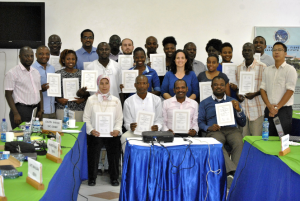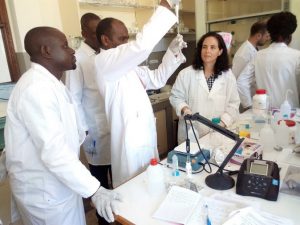
Training participants receive IAEA certificates for HAB sampling and toxin analysisat the Kenya Marine Fisheries and Research Institute in Mombasa, Kenya. Credit: NOAA

NCCOS researcher instructs IAEA course participants on preparing and testing algal samples for toxicity at the Kenya Marine Fisheries and Research Institute. Credit: NOAA
NCCOS recently led a two-week training course on harmful algal bloom (HAB) sampling and toxin analysis at the Kenya Marine Fisheries and Research Institute in Mombasa, Kenya. This regional training course was organized for countries throughoutAfrica withsupport of a United Nations International Atomic Energy Agency (IAEA)-funded project to establish toxin sampling and analysis capabilities in African nations. Participants representedAlgeria, Côte d'Ivoire, Democratic Republic of the Congo (DRC), Ghana, Kenya, Morocco, Nigeria, Sudan, the Seychelles, and Tanzania. Topics covered during the training included algal sampling, Paralytic Shellfish Poisoning (PSP) and Ciguatera Fish Poisoning (CFP) toxin extraction from shellfish and finfish, respectively, data analysis, and ademonstration of NCCOS-developed receptor binding assays.
HAB toxins accumulate in marine resources and are a major cause of human seafood poisoning around the world. The presence of HAB toxins in seafood also impedes economic development and international trade.Coastal waters of these African countries are impacted by PSP and CFP toxin. This NOAA and IAEA Collaboration on Harmful Algal Blooms training provides the tools needed to protect consumers of domestic shellfish and finfish products across the African continent, and to enhance economic growth by enabling the toxin testing required for exporting seafood. Similar training courses from this partnership were given over the past two decades in countries throughout Southeast Asia, South America, Central America, the Middle East, and Southern Africa.
For more information, contact Tina.Mikulski@noaa.gov
 Official websites use .gov
A .gov website belongs to an official government organization in the United States.
Official websites use .gov
A .gov website belongs to an official government organization in the United States. Secure .gov websites use HTTPS
A lock or https:// means you’ve safely connected to the .gov website. Share sensitive information only on official, secure websites.
Secure .gov websites use HTTPS
A lock or https:// means you’ve safely connected to the .gov website. Share sensitive information only on official, secure websites.